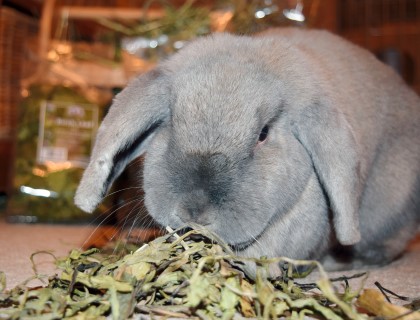New findings show that many pet owners are inadvertently putting their rabbits on the road to ill-health through incorrect feeding and management.
Misconceptions about feeding mean many vets are seeing rabbits suffering obesity, gut problems and dental disease. Of the top six rabbit health problems seen by vets in the past 12 months – some of which, like flystrike, can be fatal – all but one was attributed to poor diet.
The British Veterinary Association, British Small Animal Veterinary Association and British Veterinary Zoological Association have found that while many rabbit owners may know that carrots should only be fed as occasional treats due to their high sugar content, many myths still prevail around the best food.
Gudrun Ravetz, President of the British Veterinary Association, said:
“Rabbits are fantastic animals, but for years they were considered an easy or great first pet and we’re still seeing the effects of that. Some rabbit owners don’t realise the kind of care they are providing is making their rabbit unwell and by the time they find out, it might be too late for their pet.”
Rabbits should be fed fibre-based, plain diets packed with clean hay, grass and leafy greens such as broccoli, cabbage and kale – but never lettuce. This will help avoid stomach issues, although changing a rabbit’s diet should be done gradually to avoid dangerous digestive problems.
A correct diet will also assist in preventing dental problems – the most common rabbit complaint seen by vets – as it will help keep moderate the length of rabbit’s long front teeth which continue to grow throughout their lifetime. Rabbits should not be fed “rabbit muesli”.
The RSPCA is also finding that rabbits get a raw deal. Last year, it investigated 3,936 complaints regarding rabbit welfare – about a total of 14,787 of these pets. The animal welfare charity rescued 3,024 rabbits, including 858 who had been abandoned, and found thousands of those new homes.
Dr Jane Tyson, the RSPCA’s rabbit welfare expert, explains: “Rabbits can be wonderfully rewarding pets. Unfortunately, a lot of rabbits get a very poor deal.
“Rabbits won’t thrive if left out in a hutch at the bottom of the garden with no human interaction. They are very inquisitive, intelligent animals, all with their own personalities, and they can be a joy to look after.
“But they are also a responsibility and a commitment, and prospective owners need to ensure they can provide several things before committing to getting a rabbit.”
She says that basic rabbit needs include a large, secure enclosure with shelter from the elements, places to hide, things to investigate and toys to play with.
“They love to forage for food,” she says. “They need constant access to hay and fresh water, as well as companionship. Unless advised otherwise by a vet or qualified animal behaviourist, rabbits should be kept with at least one other friendly rabbit.”
“If rabbits are happy and healthy, they can make excellent pets – and can even be trained. They can be litter-trained, clicker-trained, and even taught to come when they’re called.”


